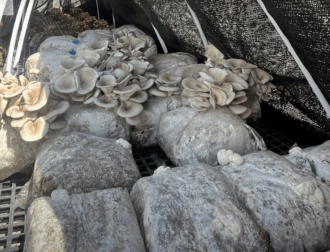A recent Northeast SARE Farmer Grant project worked with several farms to test different methods of growing mushrooms alongside other crops, as well as measuring how much profit they could bring to farmers’ bottom line.
In Farmer Grant project FNE24-077, “Forest Mushroom Production On Ready-to-Fruit Blocks”, Farmer Grant Project Leader Willie Crosby, of Fungi Ally in Massachusetts, worked with three different farms to test the viability and profitability of incorporating mushrooms into their existing operations. Each farm had a unique approach to supporting mushrooms as they completed the final weeks of their growing process to produce edible fruit; including using cloth covered low tunnels, the shade of a forest, and a wire rack atop a building in Washington D.C.
From the project final report:
Many studies have looked at the feasibility of outdoor shiitake log cultivation or indoor cultivation on supplemented sawdust ready-to-fruit blocks (referred to simply as blocks in this document) but none have looked at the intersection of the two. Outdoor shiitake log cultivation is very slow—the initial inoculation method is time intensive and crop cycles take four years to complete. Over the last ten years, specialized farms have emerged throughout the region that sell blocks. Typically, these blocks are fruited indoors in specialized rooms that control temperature, humidity, and lighting. Creating and maintaining these rooms is expensive and time consuming. This project aims to blend these two methods for the merged benefits of each.
Fruiting blocks outdoors, in natural environments, can yield high quality mushrooms. Compared to the four-year crop cycle of inoculated logs, blocks have a crop cycle of between two to four weeks. Generally, the blocks are inoculated on separate specialized farms, saving substantial amounts of time. Farmers managing diversified farms have a lot to manage. Adding indoor mushroom cultivation areas, which require daily maintenance and specialized care is often a big barrier of entry. By contrast, fruiting in outdoor areas requires very minimal maintenance, initial set up, or specialized knowledge. Amazingly, much of the time the mushroom quality is increased when fruited outdoors, particularly in the spring and fall.
View Related SARE Grants:
- Forest Mushroom Production On Ready-to-Fruit Blocks (FNE24-077)
- Growing the Specialty Mushroom Industry in the Northeast (LNE19-376)
- The Impact of Mushroom Extracts on Honey Bee Health (FNE19-926)
